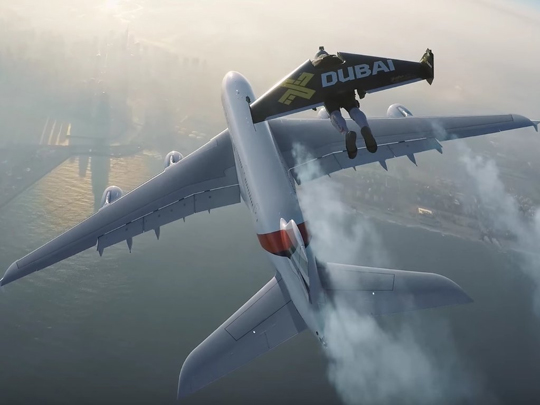Abu Dhabi, Nov 7: Is it a bird? Is it a plane? Is it Superman? Nope, It's just Dubai's resident 'JetMan' flying alongside the Emirates A380 at about 4,000 feet.

In a video that went viral on Thursday, Yves Rossy and Vincent Reffet, have now become the only two people in the world to fly with the innovative Jetman wings, on either side of the Emirates A380 aircraft over an impressive scenery: Palm Jumeirah and Dubai skyline with Burj Khalifa in the background.
Flying at about 4,000 feet, the A380 aircraft was seen cruising Dubai’s skies before the two jet men were deployed from a helicopter hovering above. The two 'JetMen' make this dangerous feat of flying alongside an airplane that can hold over 800 passengers look straightforward.
Despite the entire feat looking super easy, Emirates 24/7 reports that it took weeks of "painstaking planning and meticulous collaboration with an intense focus on safety" to finally reach the filming stage.
Adel Al Redha, Executive Vice President and Chief Operations Officer for Emirates said in a press release that, “This display between man and machine celebrates the magic and beauty of flight, a feat which just over a hundred years ago would have seemed an impossible dream. It also showcases how far human vision and ambition has, and can continue to push aviation’s boundaries.”
"We will be mosquitoes flying with an eagle or condor," Rossy said in a behind-the-scenes video.
A practice flight was conducted on 12 October and the final formation flight and filming took place on 13 October.




Comments
I do not even know how I stopped up here, but I assumed this post used to be great.
I do not realize who you are however definitely you are going
to a well-known blogger for those who aren't already.
Cheers!
Here is my page :: best entry level digital piano: http://owencollier.com/index.php/component/k2/itemlist/user/1120707
This is really attention-grabbing, You are a very
skilled blogger. I have joined your feed and sit up for in the hunt for
extra of your fantastic post. Additionally, I've shared your site in my social networks
Check out my site: best digital
piano Weighted keys: http://jiaozhanji.net/comment/html/index.php?page=1&id=18177
Hi to every body, it's my first go to see of
this web site; this web site contains remarkable and truly excellent material designed for readers.
Visit my web blog ... which keyboard: http://hldtxx.gznsjy.net/comment/html/index.php?page=1&id=11860
It's very straightforward to find out any topic on web as compared to
textbooks, as I found this article at this web page.
Here is my web site: what is digital piano (Larae: http://www.diluya.cn/comment/html/index.php?page=1&id=89918)
Hello to every body, it's my first go to see of this web site; this weblog contains amazing
and actually good material designed for visitors.
my homepage: digital piano reviews 2014: http://www.ys12345.com/comment/html/index.php?page=1&id=34993
Add new comment